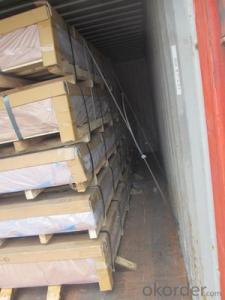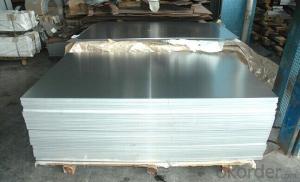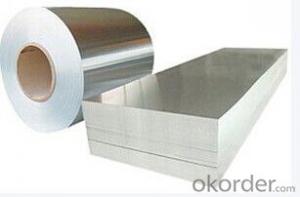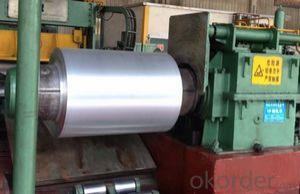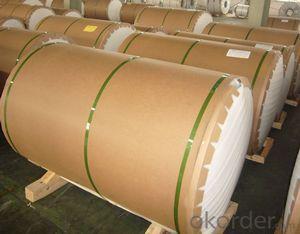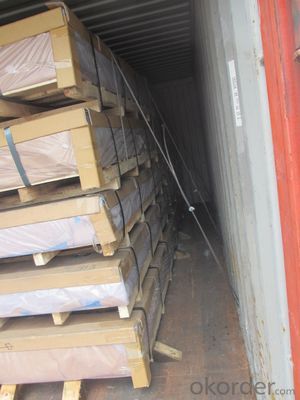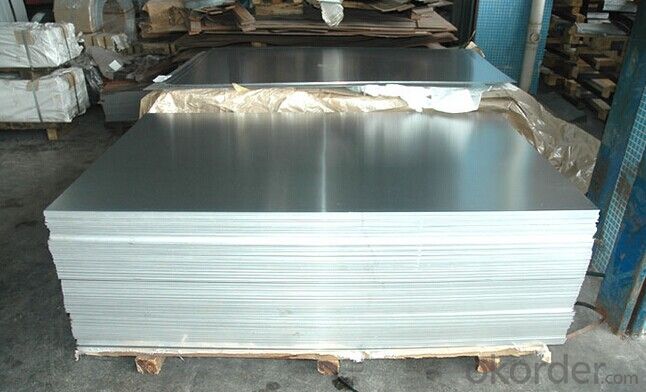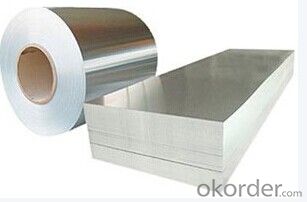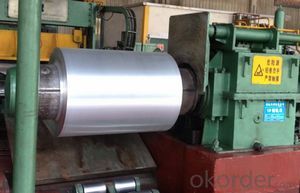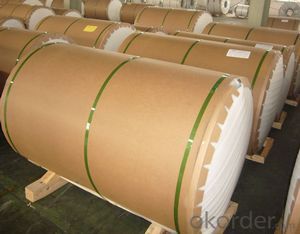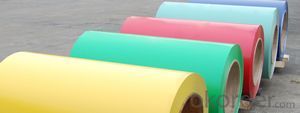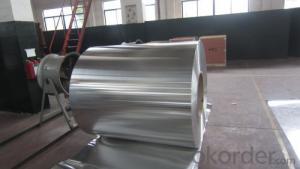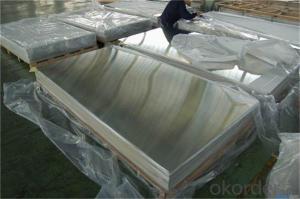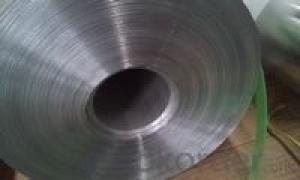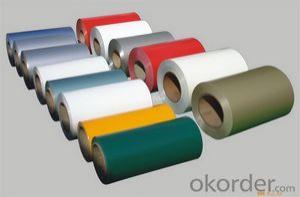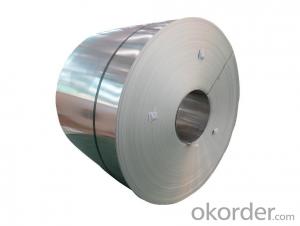1060 Aluminum Coil - AA 3005 Aluminium Sheet
- Loading Port:
- China Main Port
- Payment Terms:
- TT OR LC
- Min Order Qty:
- -
- Supply Capability:
- -
OKorder Service Pledge
Quality Product, Order Online Tracking, Timely Delivery
OKorder Financial Service
Credit Rating, Credit Services, Credit Purchasing
You Might Also Like
supply Mill-finished / coated aluminum plate/sheet/ coil:
Alloy: AA1050,1060,1100,1200,2024,3003,3304,3005,3015,5052,5086,5754,5083,6061,7050,7475,8011, etc
Temper: O, H14/16/18/22/24/32/ H112/H321/T6,T851,T7451,T7351, etc
Thickness: 0.02mm—20mm
Width: 100mm—2000mm (Can be slitted)
Notice: PE coating / PVDF coating / Embossment can be done if required.
- Q: What are the proper storage methods to maintain the quality of aluminum coil for future use?
- <p>To store aluminum coil for future use, ensure it is kept in a cool, dry place away from direct sunlight and moisture. Stack the coils on flat, level surfaces with appropriate padding to prevent damage. Avoid stacking with other metals to prevent galvanic corrosion. Use clean, dry hands or gloves when handling to prevent oil and dirt from contaminating the surface. Store in a controlled environment with a relative humidity below 65% and a temperature between 32掳F to 90掳F (0掳C to 32掳C). Regularly inspect the coils for any signs of corrosion or damage.</p>
- Q: Can aluminum coils be used for electrical transmission lines?
- Yes, aluminum coils can be used for electrical transmission lines.
- Q: What maintenance is required for aluminum coils?
- Maintenance for aluminum coils typically includes regular cleaning and inspection to ensure efficient performance and longevity. Here are some specific maintenance requirements for aluminum coils: 1. Cleaning: Regularly clean the aluminum coils to remove dirt, dust, and debris that can accumulate on the surface. Use a soft brush or a vacuum cleaner with a brush attachment to gently remove any loose particles. Avoid using abrasive cleaners or brushes that can scratch or damage the surface of the aluminum. 2. Inspection: Periodically inspect the aluminum coils for signs of damage or wear. Check for any bent or dented fins, which can restrict airflow and reduce the coils' efficiency. Look for signs of corrosion, such as discoloration or pitting, as this can affect the coils' performance and lifespan. 3. Coil Protection: Apply a protective coating or sealant to the aluminum coils to prevent corrosion and damage from exposure to moisture, chemicals, or harsh environmental conditions. This can help prolong the life of the coils and maintain their performance. 4. Lubrication: If your aluminum coils are part of a mechanical system, such as an HVAC unit, ensure that any moving parts are properly lubricated. This can help reduce friction and wear on the coils, improving their efficiency and preventing premature failure. 5. Professional Maintenance: Consider scheduling regular professional maintenance for your aluminum coils, especially if they are part of a larger system. HVAC technicians or specialized coil cleaning services can provide a thorough inspection, cleaning, and maintenance to ensure optimal performance and identify any potential issues early on. By following these maintenance practices, you can help extend the lifespan of your aluminum coils, improve their efficiency, and prevent costly repairs or replacements.
- Q: Can aluminum coils be used for architectural facades?
- Yes, aluminum coils can be used for architectural facades. Aluminum is a popular choice for architectural facades due to its lightweight nature, durability, and versatility. Aluminum coils can be easily formed into various shapes and sizes to create innovative and visually appealing facades. The material is resistant to corrosion, making it suitable for outdoor applications. Additionally, aluminum can be easily coated or finished to enhance its aesthetic appeal and protect it from environmental elements. Overall, aluminum coils offer a cost-effective and sustainable solution for architectural facades.
- Q: Can aluminum coils be used in the production of electronic components?
- Yes, aluminum coils can be used in the production of electronic components. Aluminum is a versatile and widely used metal in various industries, including electronics. It offers several advantages such as lightweight, high thermal conductivity, corrosion resistance, and excellent electrical conductivity. These properties make aluminum coils suitable for applications in electronic components like capacitors, transformers, inductors, and heat sinks. The use of aluminum coils in electronic components enables efficient heat dissipation, improved performance, and reduced overall weight of the electronic devices.
- Q: Are aluminum coils suitable for air conditioning systems?
- Air conditioning systems can utilize aluminum coils, which are commonly employed due to their numerous advantages. Firstly, aluminum, being a lightweight material, facilitates ease of handling and transportation during installation. Additionally, this lightweight characteristic reduces the unit's overall weight, rendering it more energy-efficient. Moreover, aluminum coils possess exceptional heat transfer properties, thereby enabling efficient air cooling. They exhibit enhanced thermal conductivity, facilitating rapid and effective heat transfer. Consequently, this leads to improved cooling performance and enhanced energy efficiency, resulting in reduced electricity consumption and long-term cost savings. Furthermore, aluminum coils surpass other materials, such as copper, in terms of superior corrosion resistance. Given the exposure of air conditioning systems to moisture and humidity, this resistance is crucial. Aluminum coils can withstand these conditions without corroding or deteriorating, ensuring a longer lifespan and reliable performance. Another advantage of aluminum coils lies in their affordability. Aluminum is a cost-effective material, making it a favored choice among air conditioning manufacturers. This affordability subsequently translates into lower costs for consumers, making air conditioning systems more accessible and economically viable. In conclusion, the suitability of aluminum coils for air conditioning systems is evident due to their lightweight nature, impressive heat transfer properties, corrosion resistance, and affordability. They offer efficient cooling capabilities, durability, and cost-effectiveness, establishing themselves as the preferred choice for air conditioning units.
- Q: This question asks for the current prices of aluminum coil in various regions around the world.
- <p>The price of aluminum coil can vary significantly based on factors such as market demand, supply, transportation costs, and regional economic conditions. Prices are typically quoted per metric ton and are influenced by the London Metal Exchange (LME) and regional metal exchanges. For the most accurate and up-to-date prices, it's best to consult with local metal suppliers or check online commodity trading platforms. Prices can change daily, so real-time data is essential for making informed decisions.</p>
- Q: What is the expected lead time for manufacturing aluminum coils?
- The expected lead time for manufacturing aluminum coils can vary depending on the complexity of the order, the quantity needed, and the production capacity of the manufacturer. Generally, it can range from a few weeks to a couple of months.
- Q: Can aluminum coils be used in heat exchangers?
- Indeed, heat exchangers can utilize aluminum coils. The utilization of aluminum in heat exchangers is prevalent owing to its exceptional thermal conductivity and resistance to corrosion. Aluminum's remarkable thermal conductivity enables efficient heat transfer, rendering it an optimal substance for heat exchangers. Furthermore, the coils' endurance and functionality in challenging surroundings are guaranteed by aluminum's resistance to corrosion.
- Q: Aluminum roll 220 kg.0.3 thickness, 500 width, roll diameter is how much?
- You can use the outside diameter, the inner diameter and the width to get the volume. You know the density and volume, and then you can find the weight naturally
Send your message to us
1060 Aluminum Coil - AA 3005 Aluminium Sheet
- Loading Port:
- China Main Port
- Payment Terms:
- TT OR LC
- Min Order Qty:
- -
- Supply Capability:
- -
OKorder Service Pledge
Quality Product, Order Online Tracking, Timely Delivery
OKorder Financial Service
Credit Rating, Credit Services, Credit Purchasing
Similar products
Hot products
Hot Searches
Related keywords
